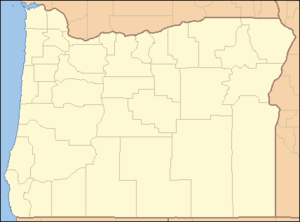Tanner Creek
| Tanner Creek | |
| Name origin: After a tannery built along the creek by Daniel Lownsdale in 1845. | |
| Country | United States |
|---|---|
| State | Oregon |
| County, city | Multnomah County, Portland |
| Source | |
| - location | Tualatin Mountains (West Hills) |
| - coordinates | 45°30′32″N 122°43′55″W / 45.50889°N 122.73194°W |
| Mouth | Couch Lake (Willamette River) |
| - coordinates | 45°31′09″N 122°40′54″W / 45.51917°N 122.68167°WCoordinates: 45°31′09″N 122°40′54″W / 45.51917°N 122.68167°W |
Tanner Creek is a small tributary of the Willamette River in Portland in the U.S. state of Oregon. Named after a tannery owned by one of the city's founders, it begins in what is now the Sylvan–Highlands neighborhood in the Tualatin Mountains (West Hills) west of downtown. In the 19th century the creek flowed on the surface, running northeast across the city, past what later became Providence Park and into a shallow lake (Couch Lake) and wetlands in what became the Pearl District, bordering the river.
Late in the century, the city began re-routing Tanner Creek and other West Hills streams into combined sewers and filling their former channels and basins to make flat land for homes and businesses. In the 21st century, Tanner Creek is nearly invisible, flowing through a conduit (but not a combined sewer) that empties into the Willamette at Outfall 11, near the Broadway Bridge. Structures along the former course of the creek include Vista Bridge and Tanner Springs Park as well as Providence Park.
Daniel Lownsdale, an early Portland settler and one of Portland's founders, built a tannery along the creek in 1845. The creek was named for the tannery.
Canyon Road, important to Portland's early development, was built along Tanner Creek canyon. First opened in 1849, the road connected Portland to the Tualatin Valley. Lownsdale was the surveyor on an improved version, a plank road, two years later, which began near the future site of the Portland Art Museum.
...
Wikipedia

